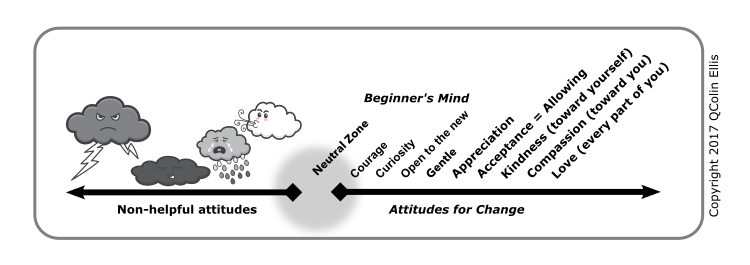Gratitude is a meme you find everywhere, including in mindfulness circles. “Love Yourself!” is a cliché mindfulness teachers extol. But could they be too big a leap for a significant number of people?
Six years on, Mary was still grieving the death of her spouse. She told me, “I’ve nothing to be grateful for. I want to appreciate life but I can’t stop my mind from being constantly negative. It refuses to stay positive!”
People enduring chronic stress and anxiety often express these sort of feelings. It is helpful to keep it real, in the present moment. Appreciation is about what you can see, hear, smell, taste or touch right now. I asked Mary to look around and find something to which she can say — nothing more than — “That’s OK.” She looked around at the clutter and dull decor; “I can’t find anything.”

“Go macro”
On digital cameras, there is a macro button, which zooms into the target area — say, a butterfly or small flower. In the same way, find something small. It could be a tiny, shining glimmer of light on a surface (or through the curtains) or an interesting shape (maybe cast by a shadow), a colour or texture.
An extension to the visual appreciation is to use your other senses. Listen for a sound to which you can concede, “That’s OK.” Maybe, listen for the silence between the din? Most people wear clothing that’s pleasant to your skin; scan your body for the places where you feel the texture or warmth. Don’t forget to acknowledge it with a “Hmm, that’s OK.” Same goes for any acceptable aroma or taste; remembering to admit that it’s decent, if not agreeable.
You may notice, your awareness of gratifying details in your environment become more frequent; especially immediately after you find the first, another catches your eye. As you get into the practice, the words that fit your latest treasure will be at higher levels of appreciation. Instead of “OK”, you may hear yourself proclaim, “That’s delightful”, or “Oo, how wonderful”, or just “Wow!”
Why haven’t I mentioned gratitude?
Gratitude is giving thanks. That means there is a receiver of our thanks. There is also the quality of being thankful. In this sense, we could be grateful to the universe, ourselves, or environment; but there is still a perceived giver. Appreciation, on the other hand, needs no outside agent.
Appreciation is a recognition and enjoyment of the good qualities of something.
Dictionary
In this sense, it is more accurate within the context of mindfulness to use the word appreciation.
Can we not be thankful for what we experience in the present moment?
Although grateful for the Christmas or birthday presents that surround you, the giving had already taken place. Appreciation is about what is apparent to you right now, but may not have been there a few moments ago (such as a rainbow), and could be gone in the next. Gratitude is about things you have already received. Once you have had the encounter and embraced it, you may be grateful you had it, or grateful you are still experiencing it.
Without appreciation, gratitude is unreasonable to muster.
Q.C. Ellis
Overcoming anxiety with a rare mindfulness practice
Using the macro-lens of appreciation, you are not being asked to be thankful. You are simply accepting the fact there is something that is OK within your immediate circumstance. Something tangible (you are using one of your five senses) and may change, but right now it is OK (maybe pleasing).
For many people, this doesn’t seem like a step forward. But those enduring chronic anxiety or depression will find it hard to see anything in a positive light. The despair they are in is why this practice is so important.
It also works if you do not have stress or trauma affecting your moods.
Occasionally, I hear people declare “You should love yourself and embrace gratitude.”; which is fine if you are not one of the growing numbers of people suffering from the stigma of chronic stress and anxiety.
Unfortunately, the sentiment also makes it almost impossible for those within this dungeon to get out.

Love and compassion are at the far end of a continuum of attitudes. In the middle are things such as gratitude and acceptance. At the end closest to the neutral zone of being non-judgmental* there are attitudes of being gentle toward yourself, and appreciation.
- * I am not fond of the term, non-judgemental. Without a full explanation and multiple reminders, many people with chronic stress will immediately judge themselves as being unable to use mindfulness. This is due to all the judgements they notice in their mind. I prefer to describe the neutral zone as neither negative nor positive. One could declare my reasoning as semantics, but for those who need mindfulness the most, the accuracy of words they can relate to, matters. You can discover more about the five levels of stress and the continuum from non-helpful attitudes to the authentic attitudes of change in the book: Stress Anxiety and the Battle for Your Sanity (unpublished while it is revised).
We need to start from where we are
Suppose you are experiencing anxiety at the chronic level. In that case, it’s arduous to be positive (and it never lasts), difficult to be accepting of your indisposition, and almost impossible to love yourself. You are fully aware of your non-helpful attitudes dominating your mind and feelings. But to jump from here to love, compassion and gratitude is not a leap you can make without a considerable amount of support.
A more elementary step, is to decide to be gentle on yourself. For instance, when you notice you are berating yourself for feeling the way you feel. Another stride forward is to find within your environment (using any of your five senses) something about which you can acknowledge, “That’s OK.”
Like I said to Mary, “Do this at least 12 times every day when you remember. Immediately you remember you haven’t done this for a while; be gentle on yourself and look around for something to appreciate. If you don’t find something, go macro. When you do find something, congratulate yourself, as a reminder to your subconscious mind this is something you want more of.”
I couldn’t get Mindfulness-Based Stress Reduction to work
Months later, Mary told me, “I had been to a couple of Mindfulness-Based Stress Reduction courses and other mindfulness classes and knew there was something in it but couldn’t get mindfulness to work for me in a lasting way. I hadn’t heard of appreciation as you described it.” She continued, “I was surprised at how quickly appreciation got my mind back on track. When I decided, not just to do it when my mind was being negative, that’s when my life began to change dramatically.”
By initially working with being gentle and appreciation, it becomes easier to introduce the beginner’s mind, and nudge yourself in the direction of acceptance (allowing) and gratitude.
Since being gentle is an aspect of compassion, and appreciation is an ingredient of love, you are already connecting with, and developing these natural qualities — but delicately — from where you find yourself on the continuum.
Q.C. Ellis
Mary now bubbles with gratitude and is able to appreciate life.
PS: I am very aware that love and compassion are your True Nature, as are peace and joy. But I also know it can be difficult to experience it when we are stuck in non-helpful states — which is why I will be writing a lot more about how to make the transition to embodying your True Nature.
Author
Colin is an award-winning writer under the pen-name Q.C. Ellis

